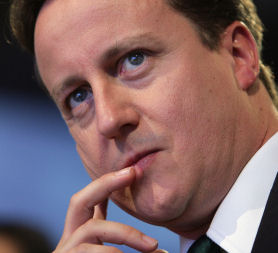FactCheck: Labour NHS cuts?
Updated on 06 October 2009
Conservative party leader David Cameron announced at the weekend that Labour is the only party in history to have chopped NHS spending. Is he right?

The claim
"Go back in your history and ask yourself what was the only government that actually cut the National Health Service. It was the Labour government in the 1970s because they'd run out of money because they didn't address the deficit."
David Cameron MP, Conservative Party leader, BBC One's Andrew Marr show, 4 October 2009
The background
Cuts, deficits, and NHS - three words likely to loom larger and larger in the run-up to the election.
Both parties have accepted the needs for cuts, with the Tories calling for faster action to slash the bulging budget deficit. The Tories have also promised to protect NHS spending; the health secretary said this summer that Labour would never cut the NHS.
At the start of the Conservative party final pre-election conference, Tory leader David Cameron took a swipe at Labour's record on budget deficits, and the NHS.
The only government ever to have cut the NHS was, he claimed, Labour, back in the cash-strapped seventies.
Labour has long been proud of its history as the party of the NHS - the creation of a universal, free health service regularly features high in lists of party achievements.
But talk of forced cuts is particularly resonant right now. All the major parties have accepted the need to address the national debt. The Tories frequently attack Labour over for racking up a budget deficit bigger than the amount Britain was borrowing in the Seventies, when the country needed help from the IMF.
So is Cameron's claim true?
The analysis
Back to the history books - or rather, historical spreadsheets.
The Institute for Fiscal Studies produces a series of figures on NHS spending over time.
These are based on recent Treasury figures combined with data on the growth in NHS spending year on year since it started.
And these show a fall in real-terms spending in 1977-78, from £31.8bn to £31.3bn (in 2009-10's money). As Cameron said, this was at a time when public spending was being cut as part of the IMF austerity measures.
By the following year, spending had returned to more than its 1976 level - £32.1bn in 1978-9. So it was a fairly short sharp cut, but a cut nonetheless. One to Cameron.
But is it the only cut?
Not according to this series. There were cuts too in the early Fifties: in 1950, £8.5bn (in today's prices) was spent on the NHS, in 1951-2, it fell to £8.4bn, and in 1952-3, to £8.3bn.
This came primarily under, not a Labour government, but a Tory one - Winston Churchill became prime minister in October 1951.
Does this torpedo Cameron's claim? These cuts came back in the very early days of a health system which was just three years old.
There had been concern from both parties about the rising costs of the health service, which exceeded early projections, although Labour remained committed to the idea of the free health service while the Conservatives were more skeptical about the project.
The cost of prescribing medicines was far bigger than expected; in 1952, the Tory government, which was committed to tax cuts, brought in prescription charges (something Labour had legislated for, but never enacted). And Labour chancellor Hugh Gaitskill also capped NHS spending in 1951, in the same bill.
The Conservatives set up the independent Guillebaud review of NHS spending in 1953. However, this eventually found that the costs involved were manageable.
The verdict
Total spend on the NHS has - generally - increased over the past 60 years.
Annual real-terms spending did show a fall in one year under the Labour government in the last 70s, as Cameron said.
The same set of figures also shows slight falls in spending under the Conservatives in the early 50s. How fair it is to compare that with budgets nowadays is open to debate.
FactCheck rating: 2
How ratings work
Every time a FactCheck article is published we'll give it a rating from zero to five.
The lower end of the scale indicates that the claim in question largerly checks out, while the upper end of the scale suggests misrepresentation, exaggeration, a massaging of statistics and/or language.
In the unlikely event that we award a 5 out of 5, our factcheckers have concluded that the claim under examination has absolutely no basis in fact.
The sources
Institute for Fiscal Studies tables
National archives: the NHS under pressure
National Health Service history
Your views
You've read the article, now have your say. We want to know your experiences and your views. We also want to know if there are any claims you want given the FactCheck treatment.
Email factcheck@channel4.com
FactCheck will correct significant errors in a timely manner. Readers should direct their enquiries to the editor at the email address above.





